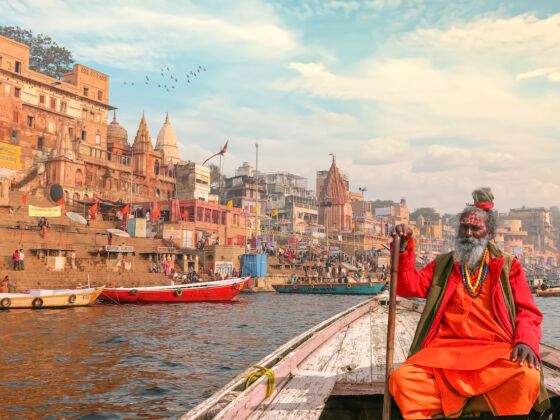DURING MY RECENT solo trip to India, I found myself thinking about the darker side of traveling – the sense of distrust, alienation, and confusion that can result from negative or disturbing experiences with another culture or traveler.

These thoughts came to me as I walked along the ghats in Varanasi. I’d been in India for less than 48 hours. Already I was joyfully immersed, but I’d also never felt so unsure of who to trust.
It wasn’t long before a male Sadhu (holy man) accosted me and made grotesque sexual advances. Without realizing it, I’d decided Sadhus were not to be trusted.
Later, a female Sadhu with an unflinching stare and a wide smile walked with me along the ghats. I grew uneasy in her presence and turned down an invitation (made with hand gestures) to go to her temple. At the last minute, I changed my mind. I ended up participating in a puja (worship), which now stands out amongst my most interesting experiences in Varanasi.
I realized that my fears had been unfounded – she’d had good intentions. But how was I to know how to distinguish between the false and the friendly?
The Threat Of Uncertainty
When frequent and intense interactions with strangers are combined with a lack of stable social support, our sense of safety can be challenged. The exhilaration of endless possibility can morph into threatening uncertainty.
Of course these challenges aren’t always related to travel. Our species is a social one, and thus we are forced to learn and re-learn about social trust and safety in our everyday lives. For these critical moments of uncertainty can determine whether or not we withdraw and cling rigidly to our perceptions or plunge forward into new territory despite our fears.
In the development of these skills, travel presents particularly difficult challenges – but the rewards can be vast.
What exactly tries our sense of trust and openness while we’re traveling? First, being in a new culture forces us to work harder to establish an initial sense of trust with local people.
Unable to understand cultural nuances, we must rely on facial expressions and body language, and recall abstract information we’ve absorbed from a book or a person. Local con-artists are quick to exploit this with false smiles which can fool even the most experienced travelers.
The Shock Of Deceit
Whatever the case, negative experiences can drain a person of their energy and enthusiasm for a place or culture. We may become bitter, withdraw, and experience feelings of anger and disappointment.
No matter how many people tell you beforehand to watch out for the tuk-tuk drivers in Bangkok or warn you of the false friendliness of the store owners in Varanasi, many of us have found ourselves in precisely the situations we were warned of.
We are duped, and if we imagine it happening again and again, this tends to fuel our feelings.
In the midst of navigating through strange physical and cultural territory, we often turn to other travelers or expats for relief.
One of the great joys of traveling is the opportunity to meet and share experiences with people from all over the world. Conversations flourish as we meet other excited travelers, opening ourselves up in ways that we might never do at home.
I’ve had unforgettable conversations and intense adventures with people I hardly knew, simply because of the open heart and spirit of adventure that so many travelers have.
But what happens when things go wrong? When you open up to someone who turns out to have ulterior motives, is dishonest or disrespectful? The sense of community, bonding, and intimacy is jeopardized. Feeling naive, we begin to question our ability to sense other people’s motivations.
A Woman’s Challenge
Women are bound to encounter more difficulty in establishing straightforward relationships with both locals and expats.
In India, I found that it just was not possible to be “friends” with an Indian man – even saying hello and making eye contact was seen as an invitation for sexual attention. In other places, such as South America, it can be outright dangerous to make eye contact, let alone speak with a man.
In some ways, this makes interactions simpler, but it also belies a sadness. As female guests in certain cultures, we are aware that any interaction with a local man may lead to a negative experience. Our only option, then, is to ignore them.
I’ve seen and heard of women who do meet the exceptions. I wonder what barriers these women came up against in establishing that rapport.
For much of my time spent in Varanasi, I felt quite raw – I’d had some negative experiences with locals, and had found that a new male expat friend was not someone to be trusted or respected.
I often had to withdraw and rest – I found that my continuous suspicion of people, my feelings of powerlessness and insecurity, were draining. Yet I kept on going – I continued to meet new people, reminded myself to keep an open heart, and reconciled myself with the culture and other travelers.
The Payoff
I won’t lie and say that this was easy. But it was worth it.
Looking back on my time spent in Varanasi, I realize how much I learned about myself and about our species. As humans, we take risks every day when we open ourselves up to other people. Unfortunately, many people who are willing to take advantage of that, whether consciously or unconsciously.
Our greatest task is to learn how we relate to others, why we relate to them in a certain way, and how our ways of relating affect not only ourselves and our intimates, but the entire world.
What do you think of the challenges of trust abroad? Share your thoughts in the comments!